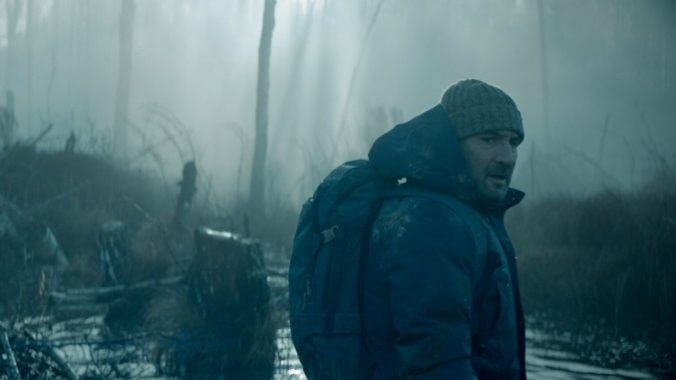
A good rule of thumb for artists to follow when telling stories about real-life events: If you need the rights to the story, but you can’t secure said rights, don’t then decide to grind the story’s details with a plot muddler and tell it anyway; you might end up making Kompromat, Jérôme Salle’s melodramatic take on a mid-2010s Russian plot to kidnap and indefinitely confine a French government agent. Salle makes the puzzling choice to sensationalize his material by swapping extraordinary details for ordinary genre tropes. A remarkable real-life, low-artifice spy thriller becomes unremarkable fiction.
In 2015, Russia’s Federal Security Service (FSB) descended on the city of Irkutsk and pinched Yoann Barbereau, director of the French culture agency Alliance Française, on nonsense charges. About a year later, Barberau went on the run, shacked up at the French Embassy in Moscow for another year, and eventually found his way back to his home country. Kompromat, a Russian word referring to blackmail material whether genuine or utterly fabricated, roughly follows that outline, but throws in Salle’s personal additions, including a drastically outdated romance subplot, a bloodthirsty Spetsnaz officer, cartoon villain representation of his Russian military antagonists, a few sharp jabs at Salle’s own government, and occasional gunfights.
Gilles Lellouche plays the Barberau stand-in Mathieu Roussel, accused by the FSB of molesting his beloved daughter, Rose (Olivia Malahieude), and passing around child pornography online. Roussel’s arrest is blatant reprisal for his two actual crimes: Staging a homoerotic ballet in Irkutsk, in keeping with his Alliance Française duties, and dancing with Svetlana (Joanna Kulig), daughter-in-law of FSB officer Rostov (Mikhail Gorevoy), in plain, innocent view of everyone. In Russia, no one dares question the FSB’s integrity and motives; that’s an easy way to get chucked into the cell right next to Roussel’s. So his fate is sealed, until he realizes that he has help on the outside, and plans his escape.
Kompromat’s biggest problem, even bigger than the trumped-up stakes and antiquated forbidden-love angle, is its dustiness. The film looks dismal and sad, perhaps intended to portray Russia as a dismal and sad place where art and culture are seen as indulgences. In an early scene, Roussel tags along on a deer hunt with his FSB counterparts, but refuses to participate in the bloodletting — low-hanging fruit to remind us that this Frenchman is a fish out of water in a country whose inhabitants despise him. The land and urban centers don’t treat Roussel any better: Every woodland and city he sneaks through while on the lam from Rostov reads as uninviting at best and hostile at worst. In Kompromat’s context, Salle’s aesthetic works. But it might work too well, because “Russia” isn’t out to get Roussel. The fascist Russian government is.
Salle provides alternate perspectives from nameless supporting characters who help Roussel on his journey, people who keep icons of Putin in their cars as smokescreens for law enforcement. Hang the image from the rearview, and suddenly you’re a loyalist above suspicion. But movies like Kompromat bank on audience perception of their locations as forbidding ecosystems where outsiders are universally hated by their authorities as well as their citizenries. There’s little effort made to play with the notion of how totalitarianism affects everyday people’s behavior; if those same good Samaritans knew what the FSB had accused Roussel of, or if they just knew he was on the run from the FSB, would they help him as willingly?
Kompromat hints at this conundrum and keeps any thoughts on its dreary surface. Diminishing the shine of an actress as luminous as Kulig is an impressive feat, but she’s left darkened as Lellouche’s object of desire, unable to perform beyond the single dimension given to her. Lellouche himself is fine, broadcasting dejection with his eyes and exhaustion with his cheeks in a movie where affecting an everyman stance is essential. He and Kulig seem equally uninspired by their characters’ relationship; their interactions are never about her, but for that matter they’re hardly about him, either, save for a lazy, easy mechanism for emphasizing his innocence. Easy is the last thing Kompromat should be. It should be steely, prickly, tense. Instead, it’s languid and slack – the “Jackie Jormp-Jomp” version of chilling state-sanctioned abduction.
Director: Jérôme Salle
Writer: Jérôme Salle, Caryl Ferey
Starring: Gilles Lellouche, Joanna Kulig, Mikhail Gorevoy, Aleksey Gorbunov, Daniil Vorobyov, Igor Jijikine, Olivia Malahieude
Release Date: January 27, 2023
Bostonian culture journalist Andy Crump covers the movies, beer, music, and being a dad for way too many outlets, perhaps even yours. He has contributed to Paste since 2013. You can follow him on Twitter and find his collected work at his personal blog. He’s composed of roughly 65% craft beer.